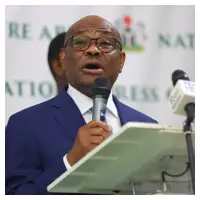Radio listeners in Calabar have expressed outrage following comments made by Cross River State APC Chairman, Barrister Alphonsus Eba, who denied that Nigerians are experiencing economic hardship under President Bola Tinubu's administration.
During a live interview on FAD FM Calabar, Eba dismissed concerns about hyperinflation, hunger, and hardship, insisting that Nigerians were not struggling to afford food or fuel despite evidence to the contrary.
"I have not seen anyone scavenging from refuse bins," Eba stated during the programme, which was monitored by DAILY POST. He further defended President Tinubu's controversial removal of fuel subsidy, arguing it was a necessary measure that prevented the collapse of the national economy.
When questioned about fuel prices skyrocketing from approximately N200 to nearly N1000 since Tinubu took office, Eba urged Nigerians to commend rather than criticize the President, claiming the government was working to restore economic stability and prosperity.
The comments triggered immediate backlash from listeners who called into the programme. Many described the APC chairman as "arrogant" and "insensitive," accusing him of being disconnected from the struggles of everyday Nigerians.
One caller, Timothy Abang, said: "Eba's responses and general attitude reveal the height of insensitivity from our political leaders. For him to claim Nigerians are not experiencing hardship shows he is more interested in appeasing those in power than addressing the truth."
Listeners also criticized Eba's conduct during the interview, noting that he frequently interrupted the programme hosts and attempted to control the narrative while listing what he described as achievements of President Tinubu and Governor Bassey Otu.
During the interview, Eba also commented on his recent appointment as Chairman of the Governing Board of the Rubber Research Institute of Nigeria (RRIN), boasting that his background as a large-scale farmer made him suitable for the role, despite still serving as state chairman of the APC.
The controversy highlights growing tensions between political leaders and citizens over Nigeria's economic situation, with many Nigerians continuing to express frustration about rising costs of living and fuel prices under the current administration.













